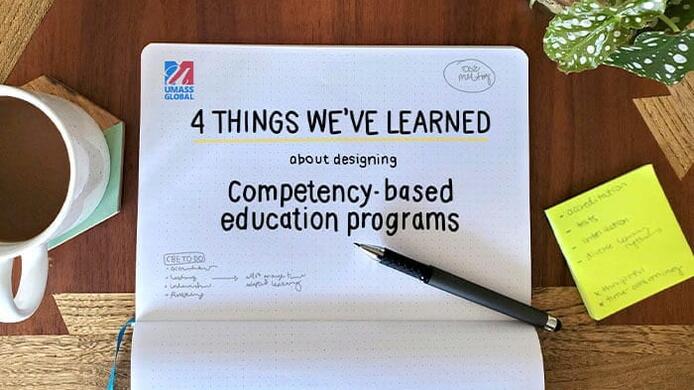UMass Global offers a wide variety of degree programs for adult learners. Explore your learning options and find a degree that fits you.

For many busy professionals who are interested in furthering their education, going back to school may not seem like an option. The commitment required to drive to and from campus for regular classes isn’t realistic for all adult students — particularly those who are balancing working full time with family or other personal responsibilities.
Fortunately, our burgeoning technological landscape continues to make distance education a more and more viable option for busy students. This was more obvious than ever during the COVID-19 pandemic, when colleges were forced to move their courses online to comply with social distancing protocols. This mass transition proved to many that taking online courses was not only feasible, but ideal for some – working professionals and parents in particular.
“Online classes can give students the flexibility they might need,” explains Brad Bourdon, director of University of Massachusetts Global’s competency-based education program, UMass Global MyPath™. He explains the core advantage being:
They can tailor or cater their schedule around their life — rather than tailoring their life around their class schedule.
Despite the benefits online learning can yield, those who’ve never taken an online class may doubt their ability to succeed in an online classroom. But the truth is that it’s not as intimidating as it may seem, especially if you have certain characteristics. We spoke with Bourdon and a handful of other online learning experts to find out which traits can help set you up for online classroom success.
You Know You're Ready for an Online Classroom Environment If…
1. You're Willing to Prioritize Time Management
One of the most prominent signs that you could conquer the online classroom is that you already have a pretty good handle on your personal time management. This becomes increasingly important if you have a bevy of other commitments you’ll need to juggle while taking online courses. Mitali Gadhia, assistant director of academic advising for University of Massachusetts Global’s online campus, says it’s important to determine whether you can create the necessary time for your classes.
“Students need to be realistic about what they can and cannot handle,” Gadhia notes. She suggests identifying your responsibilities each week, going so far as physically blocking out time in your calendar that’s dedicated to your school work along with the time you’ll need to spend elsewhere. Success in an online course takes long-term planning – while marking time on your calendar for class assignments or discussion board participation may seem unnecessary, visual cues like this can help you stay on track.
“The pace is so quick that if you are behind on one week, you are significantly behind and may find it hard to catch up,” Gadhia warns. “Yes, learning online can be quicker, but you have to be diligent with your time management to reap those benefits.”
Bourdon agrees that time management skills can be particularly important. Adult professionals – who are often accustomed to balancing full-time work with a number of other commitments – may have an advantage when taking online courses.
“The number one thing that can derail somebody in an online class is procrastinating,” he explains. “Working professionals have hopefully learned this. They have to rank their education appropriately on the scale of what’s most important in their lives.”
2. You Have Basic Technology Skills
One of the more intimidating aspects of online classes for some students is the technical know-how required to be successful. “You have to have at least a basic knowledge of computers,” explains Dr. Alisha Powell, licensed therapist, online social work professor and former online student. “There is always a learning curve with the online classroom, but the ability to troubleshoot and to know where to find the answers to technical questions is imperative.”
That said, you don’t need to be too tech savvy to find success with online learning. Some of this is due to the technological advances themselves.
“Users are not only more comfortable with technology today, but the online learning platforms have become much more intuitive,” Bourdon says.
Gadhia also points out that most working adults will already have the necessary experience with technology simply from working as a professional in a digital landscape. What are the top skills you definitely need? You should be comfortable sending emails, attaching and downloading documents, doing online research and communicating digitally. If not, you need to be willing to learn those skills.
3. You're Not Afraid to Ask for Help
One thing to consider when it comes to online learning is that being physically separated from your instructor makes it harder for them to realize you require additional assistance. Being your own advocate is essential.
“You need to be proactive about reaching out for help, because your instructors won’t know what’s normal or abnormal for you,” Bourdon explains.
For example, if you’re consistently receiving Cs on your assignments in a particular course, your instructor may simply assume that is just par for the course for you. They don’t necessarily know you tend to perform better. Bourdon urges students to ask for help if they’re struggling, possibly reaching out to the instructor’s virtual office hours. At University of Massachusetts Global, all online students also have access to the Help Desk and the Online Writing and Math Center.
4. You Know How to Articulate Yourself Well Through Writing
With the exception of video conferencing platforms, face-to-face communication is removed from most online learning environments. This means written communication skills become even more important for online students.
“Basic to intermediate writing skills are an absolute must to help students thrive in online environments,” offers Andrew DeBell, digital learning consultant at Water Bear Learning. He notes that many course evaluations and assignments are writing-based. “Having a firm grasp on writing is essential.”
Bourdon agrees. He does add, however, that if you’re less than confident in your writing abilities, it doesn’t have to prevent you from being successful in the online classroom. But you have to be willing to put some work into it.
“For those who are confident in reading and writing, it can be a benefit,” Bourdon offers. “For those who are unsure of their skills in that regard, online learning isn’t out of the question, but they may need to utilize some additional resources like the University of Massachusetts Global Online Writing Center.”
5. You're Able to Stay Motivated
The most successful online students are typically those who make a concerted effort to keep their studies high on their priority lists. DeBell offers some advice on how to maintain that internal motivation.
“Students should find their true reason for taking an online program and write it down,” he says. “When they get discouraged or confused, having a reference point and reason why is very helpful for re-invigorating motivation.”
Dr. Powell suggests that knowing what you want to study and how it will benefit you personally or professionally may keep you motivated to stay on track. She agrees that these are essentials for students who aren’t in a physical classroom.
6. You're Confident in Yourself as a Student
Finally, Bourdon points out that online courses require students to take responsibility for their own success rather than expecting the instructor to hold them accountable. “If you’re pensive or unsure or maybe just not confident in what’s expected of you, the learning curve might be a little steeper,” he says.
Working professionals may have an advantage here, as well. They’re often called upon to complete their work and meet strict deadlines without much guidance.
“It comes down to whether you’re confident in yourself as a student,” Bourdon adds. “If you’re confident in your skills, in your ability to learn, in your communication skills and in your ability to adapt and try something different, you’re more likely to find success.”
Find Your Success as an Online Student
After reviewing the six traits our experts identified as key to succeeding in an online classroom, you may be feeling more confident in your abilities to make online learning work for you and your lifestyle. The next step is finding a program that will help you thrive.
Learn more about what you should be looking for in our article, “4 Things the Best Online Programs Have in Common."





